Key takeaways:
- Audio news aggregators enhance information access, catering to auditory learners and allowing users to curate content based on personal interests.
- Preparation and building rapport are crucial strategies for successful negotiations, as they foster a collaborative atmosphere and improve outcomes.
- Emotional intelligence and active listening significantly impact negotiations, helping to address concerns and build trust between parties.
- Time management and patience are essential in negotiations; allowing space for dialogue can lead to more effective solutions.
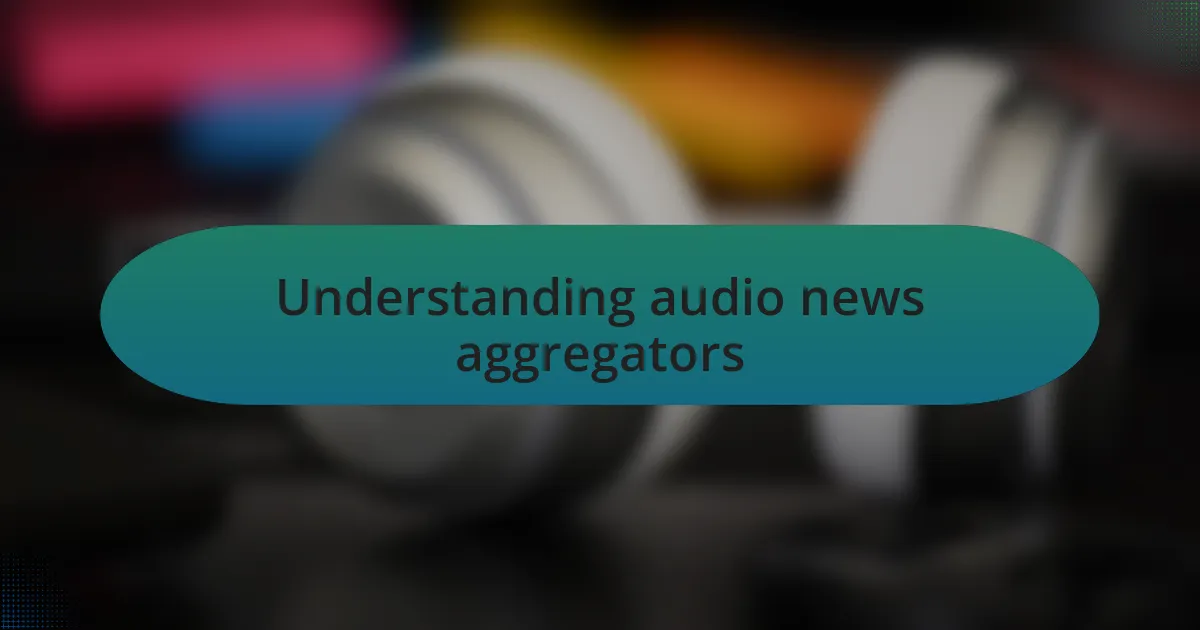
Understanding audio news aggregators
Audio news aggregators are platforms that curate and present audio content from various news sources, making it easier for users to access the latest updates in a convenient format. I remember the first time I discovered an audio news aggregator; it was a game-changer for me. Instead of reading articles during my commute, I could simply listen to the news, transforming mundane travel time into an opportunity for learning and engagement.
These tools serve not just as a time-saver, but as an equalizer in access to information. Have you ever considered how these aggregators level the playing field? With a plethora of sources available at our fingertips, we can discover diverse perspectives that we might miss from traditional news outlets. I often find myself surprised at the depth and variety of content out there, enriching my understanding of current events.
The technology behind audio news aggregators is fascinating as well. The use of algorithms to tailor content based on listening habits can be both a boon and a dilemma. On one hand, I appreciate the personalized experience, but on the other, I sometimes wonder—are we becoming too dependent on algorithms to shape our news consumption? There’s a delicate balance to navigate, and my experiences have taught me the value of seeking out information from multiple channels, rather than relying solely on what the algorithms present.
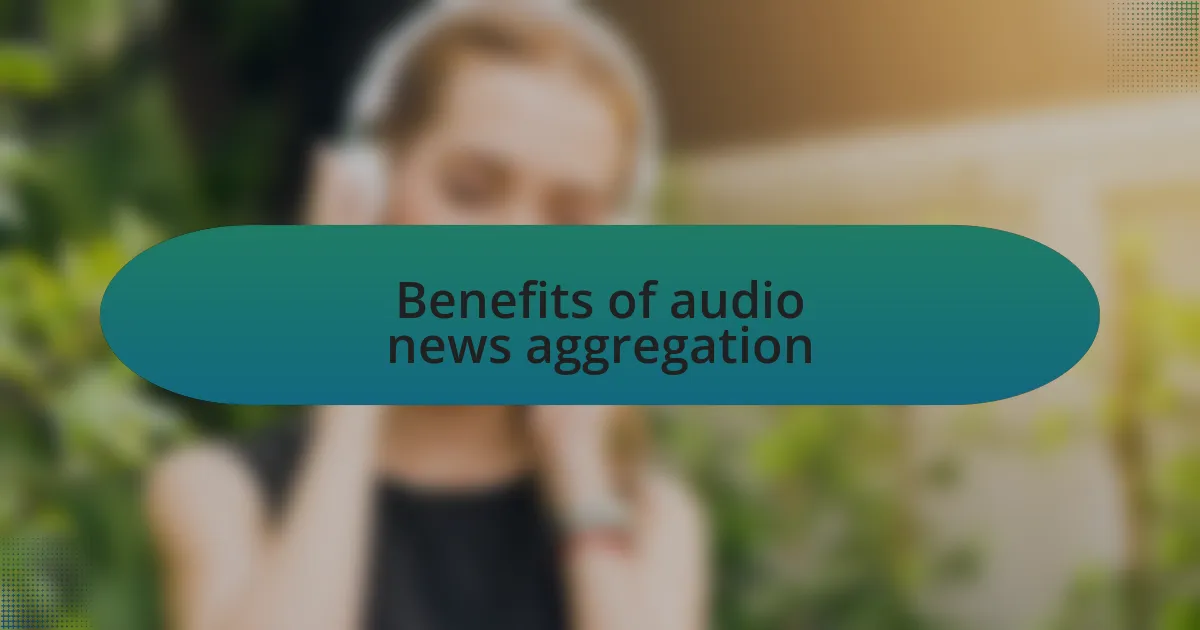
Benefits of audio news aggregation
The beauty of audio news aggregation lies in the convenience it offers. I recall a particularly busy week when I had back-to-back meetings and deadlines looming. Instead of feeling overwhelmed, I tuned into my favorite audio news aggregator during lunch breaks. Those snippets of information not only kept me informed but also allowed me to engage in conversations with my colleagues without feeling out of the loop.
Moreover, audio news aggregation enhances learning by catering to different learning styles. I’ve always been an auditory learner, so for me, listening to the news helps information stick better than just reading. Have you ever found yourself zoning out while reading lengthy articles? With audio content, I can absorb vast amounts of information in an engaging way, often feeling more connected to the stories than I would otherwise.
Another significant benefit is the ability to curate specific topics of interest. Personally, I enjoy following developments in technology and culture, so having an aggregator that specializes in those areas has been invaluable. Instead of sifting through unrelated news, I’m delivered tailored content that speaks directly to my interests. Does that resonate with you? Being able to shape my news feed has not only made me more knowledgeable but has also sparked conversations that matter most to me.
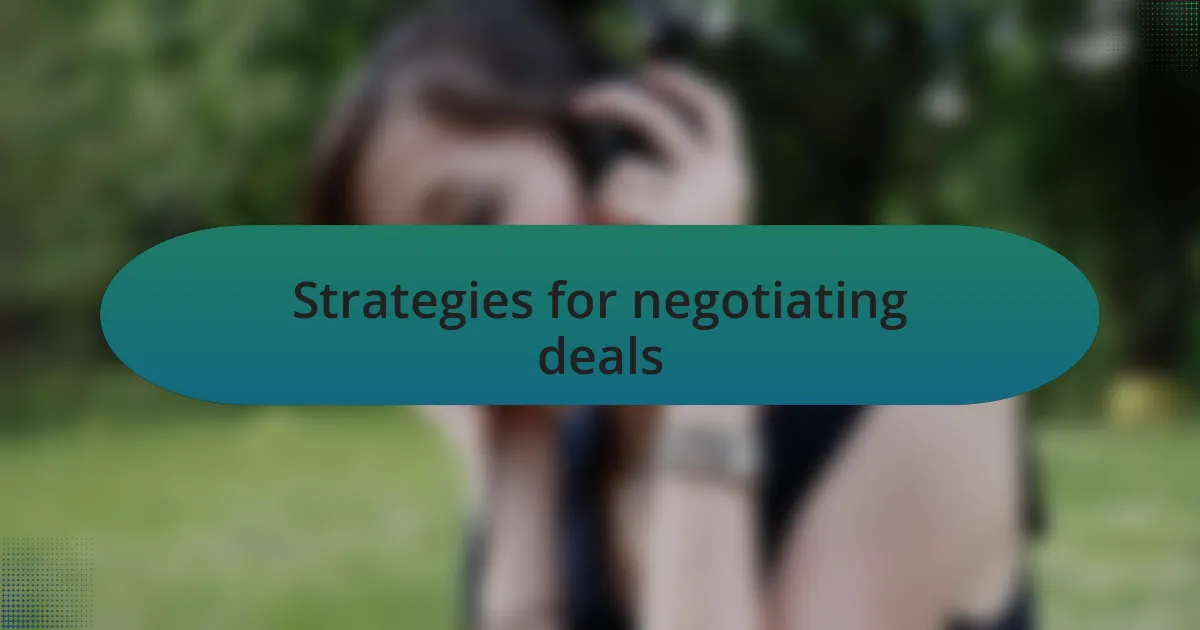
Strategies for negotiating deals
When it comes to negotiating deals, one effective strategy I’ve learned is to prepare thoroughly. I reflect on past negotiations where success was closely tied to my level of preparation. For instance, before negotiating a contract with a potential partner, I spent hours researching their business model, values, and recent developments. This knowledge not only boosted my confidence but also allowed me to present my case compellingly. Have you ever felt unprepared in a negotiation? It can really dampen your ability to assert your position.
Another tactic I find useful is establishing rapport. In my experience, building a connection with the other party helps ease tensions and fosters a collaborative atmosphere. I remember a time when I took a few minutes to engage in light conversation before discussing terms; this small effort transformed our entire negotiation. It made me wonder—how often do we overlook the human element in business encounters? When we focus on the personal connection, it often leads to more favorable outcomes.
Finally, being flexible and open to creative solutions has proven invaluable during negotiations. There was an instance when a deal seemed to hit a standstill due to a misalignment of expectations. Instead of insisting on my initial proposal, I invited my counterpart to brainstorm alternative options together. This not only broke down barriers but also resulted in a unique agreement that benefited us both. Have you tried opening the floor for collaborative solutions? It might just unlock potentials you hadn’t considered before.
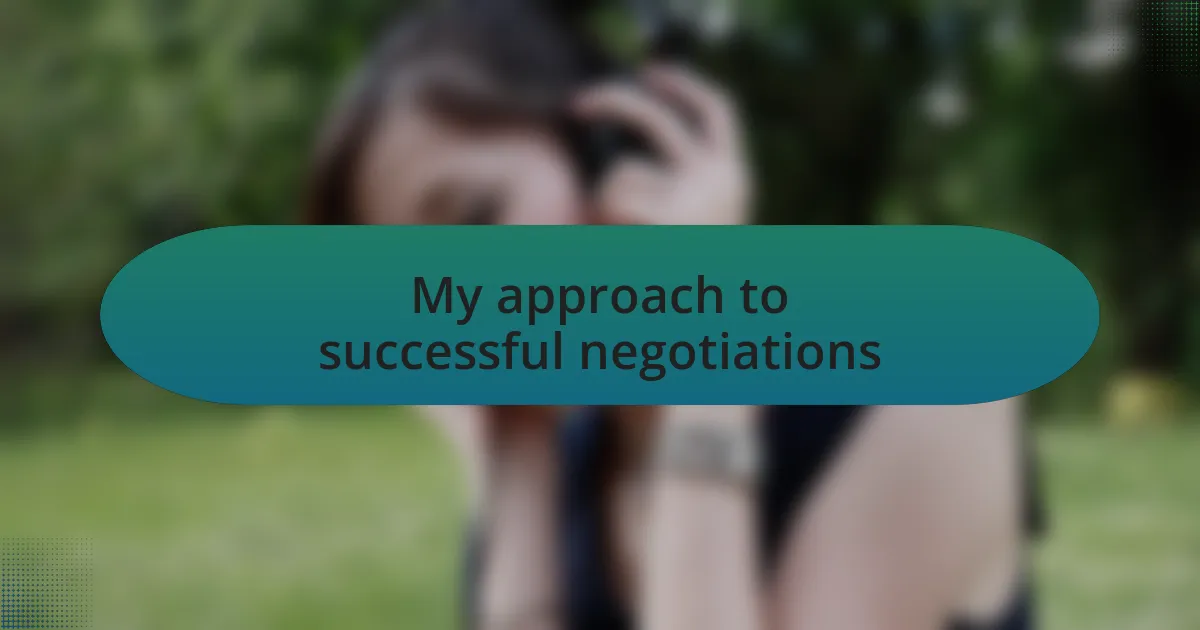
My approach to successful negotiations
Successful negotiations, in my experience, hinge on the art of listening. There was a moment when a potential client started expressing concerns that I hadn’t anticipated. Instead of focusing solely on my agenda, I paused and gave them my full attention. This shift allowed me to address their worries directly, creating space for a more open conversation. Have you ever noticed how powerful it feels when someone truly listens to you? It’s a game changer.
Another essential aspect of my approach is maintaining a positive mindset. I recall a particular negotiation that was filled with tension; both sides were deeply invested. I made a conscious effort to stay optimistic, framing each obstacle as an opportunity for dialogue. Interestingly, my attitude had a ripple effect—my counterparty began to mirror my positivity, which ultimately led us to a resolution quicker than expected. Isn’t it fascinating how our mindset can shape the direction of negotiations?
Lastly, I believe in following up after a negotiation, regardless of the outcome. I once concluded a protracted deal that felt bittersweet, but instead of fading into the background, I reached out to express my appreciation for their time and effort. This created a lasting impression and opened the door for future partnerships. Have you thought about the long-term impact of a simple follow-up? It can be the key to keeping the conversation alive long after the deal is done.
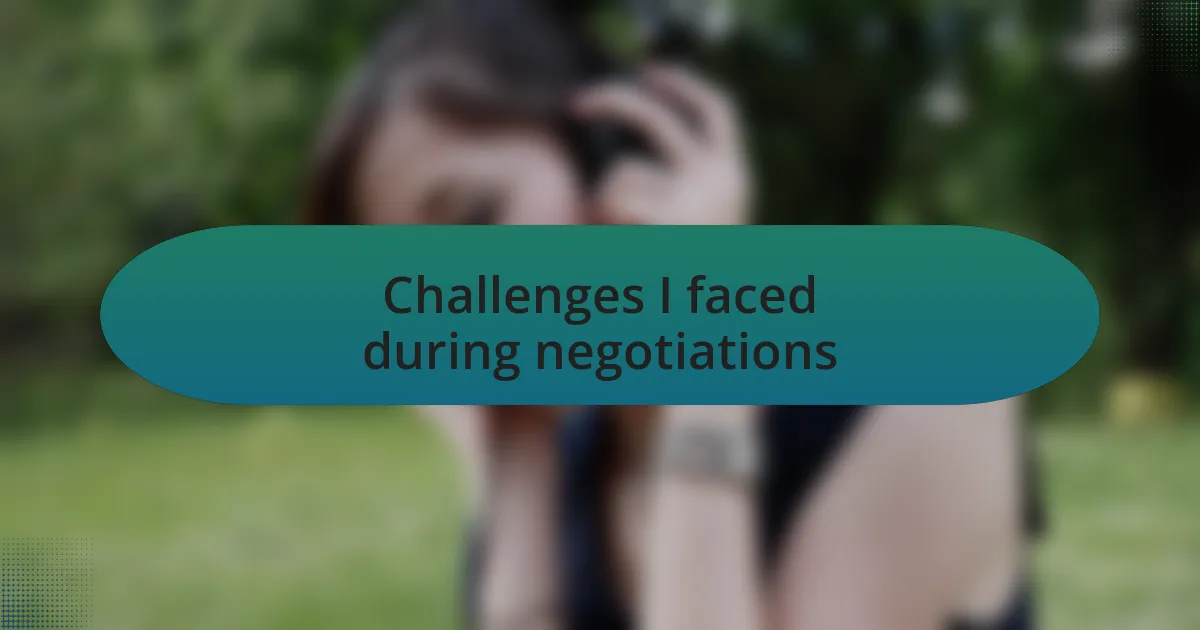
Challenges I faced during negotiations
During my negotiation experiences, I often encountered significant communication barriers. There was one instance where language differences nearly derailed a critical agreement. I remember feeling a wave of frustration as a misunderstanding led to rising tensions at the table. It forced me to adapt my communication style, opting for simpler language and visuals to bridge the gap. Have you ever felt that urgency to clarify your message amidst confusion?
Another challenge was dealing with the emotional dynamics at play. I vividly recall a situation where a negotiator was visibly upset about the stakes involved. Their emotions were so palpable that it felt as though the room was charged with electricity. I realized then that addressing these emotions head-on became essential. By acknowledging their feelings and validating their concerns, I could steer the conversation towards a collaborative tone. Emotional intelligence in negotiations can be a game changer, don’t you think?
Lastly, time constraints often pressured the negotiation process. I faced a particularly rushed negotiation where we had only a few hours to reach an agreement. The clock was ticking, and I felt the pressure mounting. It pushed me to make quick decisions without full deliberation, which is never ideal. I’ve learned the hard way that rushing can lead to oversights; this taught me to carve out ample time for future discussions. Have you ever found yourself in a time crunch that impacted your decision-making?

Lessons learned from my experiences
When reflecting on my negotiation experiences, I’ve learned that preparation is key. I once walked into a meeting without having researched the other party’s background or interests. As I listened to their priorities unfold, I realized I was at a disadvantage, grabbing at straws to keep the conversation relevant. It was a humbling moment that drove home the importance of knowledge; being well-prepared transforms the dynamic from reactive to proactive. Have you ever gone into a meeting feeling unprepared, only to wish you had invested more time beforehand?
Another significant lesson revolves around the value of patience. In one particularly tense negotiation, I felt the urge to rush to closure as the back-and-forth discussions dragged on. However, taking a deep breath and allowing the dialogue to simmer led to invaluable insights. Waiting for the right moment to introduce my proposals enabled a more organic flow and ultimately paved the way for a solution that pleased both parties. Isn’t it fascinating how sometimes stepping back can actually move things forward?
I’ve also come to appreciate the power of listening. I distinctly recall a negotiation where, instead of articulating my points, I focused intently on understanding the other party’s concerns. This shift not only helped me identify their true needs but also built trust, leading to a more fruitful discussion. It’s incredible how active listening can redefine the negotiation landscape, isn’t it?